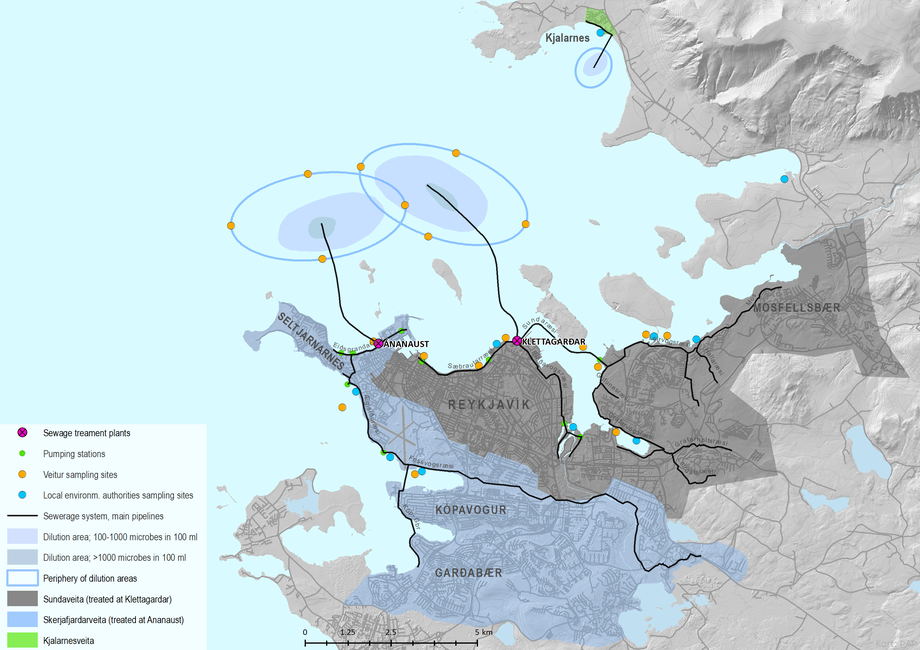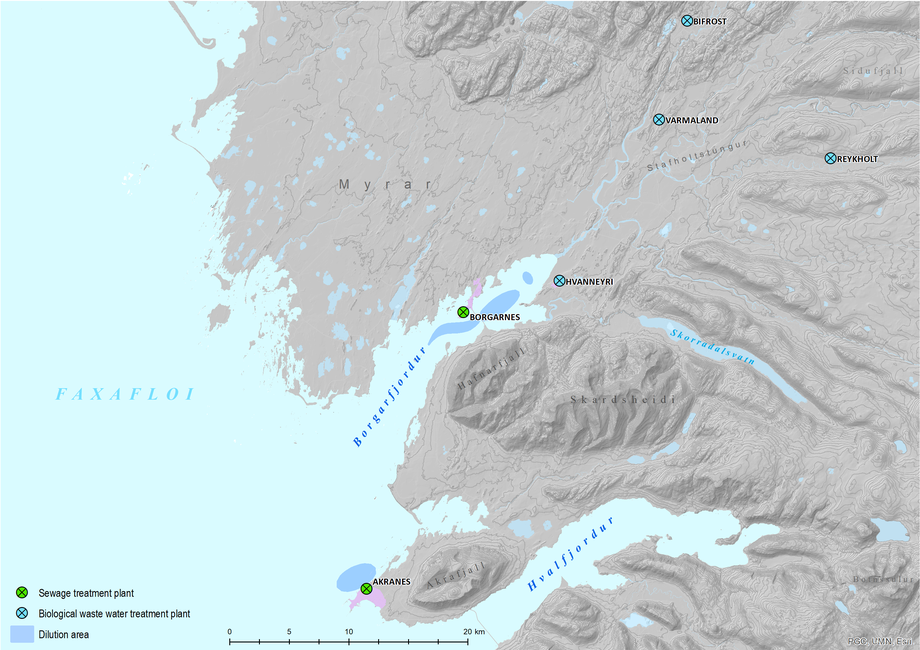Veitur Utilities manages the infrastructure and operation of wastewater systems in Reykjavík, as well as Akranes and Borgarbyggð in West Iceland. Wastewater from Kópavogur, Mosfellsbær and Seltjarnarnes, in addition to parts of Garðabær, is treated in wastewater treatment plants at Ánanaust and Klettagarðar. The infrastructure serves approximately 60% of the population.

Wastewater from about 60% of the population in Iceland is treated in sewerage treatment plants at Ánanaust and Klettagarðar in Reykjavík.

Sewerage treatment plants in Vesturland
Residents and businesses in Veitur Utilities' accumulation area have access to utility systems or sewerage treatment plants, in accordance with law and regulations.
Veitur Utilities’ long term objective is to ensure that the city’s coastline is always clean, as the shore is defined as an outdoor recreational area. However, the discharge of unfiltered sewage via overflows is an inseparable part of the sewerage system, which has been developed over the last decades. This kind of discharge will continue to be the case as long as sewage and surface water is mixed in the receptor, which accounts for approximately 28% of the sewage collection system.
Effective measures taken to reduce the discharge of unfiltered sewage via overflows are, e.g. the development of procedures to systematically search for leaks, and revision of procedures in the servicing of pumping stations, as well as devising a different criteria for the design of new stations. New procedures have increased the operational security of sewage pumping stations at Faxaskjól and Skeljanes, as well as making it now possible to carry out servicing the stations without adjourning their operations and releasing wastewater directly into the sea. Furthermore, these measures support improved working environment and employees' safety. Currently, a long term plan is being developed to fully keep infiltration of extraneous water from the sewerage system.
The result of measuring wastewater pollution on the periphery of the dilution area in Faxaflói in 2020, demonstrated that the concentration of microbes was below the threshold for faecal coliforms and enterococci in all samples taken during the year. In the vicinity of the overflow channels of Veitur Utilities in Reykjavik, and elsewhere along the city's shore, 93 samples out of 100 were below the limit for enterococci, which means very little or no faecal contamination, according to provisions in Regulation No. 796/1999 on the prevention of water pollution. A total of 97 samples were below the threshold for faecal coliforms.
The concentration of microbes in the vicinity of outlets from Veitur Utilities’ biological sewerage treatment plants in West Iceland has exceeded the limits prescribed in the operating licence over the past few years. See annual overview reports of sampling and measurements, which are accessible on Veitur Utilities’ website, please see appendices and links below.
Blue-green surface water solutions
Veitur Utilities continue working on the implementation of blue-green surface water solutions, in collaboration with municipalities, to minimise the flow of rainwater from streets, roads, and other areas into the sewerage system, and reduce the probability, and likelihood, of discharge through the system into the sea. Residents and businesses have expressed their interest in curbing the flow from their premises with blue-green surface water solutions. Thus, Veitur Utilities has conducted an assessment of the impact of overflow solutions in Laugardalur, and a comparable assessment is underway in Vatnsmýri, as well as for the drainage basin of the river Rauðará in Reykjavík.
Responsible consumer behaviour
The quantity of disposable disinfectant- and wet wipes, along with other garbage in the sewerage systems, multiplied in the spring of 2020, during the first wave of COVID-19. This resulted in a breakdown at Veitur Utilities' pumping station at Klettagarðar in Reykjavík, which led to a halt in its operations, which in turn led to raw sewage being pumped into the sea. Veitur Utilities has reiterated that toilets should not be used like dustbins, as this will inevitably result in too much strain on the equipment at treatment plants, and the environment.
Appendices and links
- Wastewater systems on Veitur Utilities website
- Wastewater System. Published material on Veitur Utilities website (IS)
- Blue-green surface water solutions (IS) (PDF)
- Piss, poop and toilet paper. Project by the Environment Agency of Iceland and Samorka (IS)
- The wastewater system, discharge of waste water and sea water quality (PDF)
- Waste water discharge reporting 2020 - Ánanaust and Klettagarðar (PDF)


